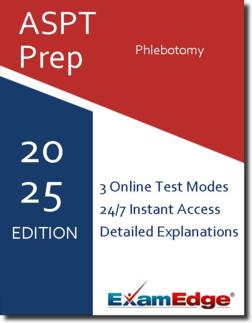ASPT Phlebotomy (PBT) Practice Tests & Test Prep by Exam Edge - FAQ
Based on 29 Reviews
- Real Exam Simulation: Timed questions and matching content build comfort for your ASPT Phlebotomy test day.
- Instant, 24/7 Access: Web-based ASPT Phlebotomy practice exams with no software needed.
- Clear Explanations: Step-by-step answers and explanations for your ASPT exam to strengthen understanding.
- Boosted Confidence: Reduces anxiety and improves test-taking skills to ace your ASPT Phlebotomy (PBT).

Why should I use Exam Edge to prepare for the ASPT Phlebotomy Exam?
FAQ's for Exam Edge ASPT Phlebotomy practice tests
- Comprehensive content: Exam Edge's ASPT Phlebotomy practice tests are created specifically to prepare you for the real exam. All our ASPT Phlebotomy practice test questions parallel the topics covered on the real test. The topics themselves are covered in the same proportions as the real test too, based on outlines provided by the American Society of Phlebotomy Technicians in their ASPT Phlebotomy test guidelines.
- Realistic practice: Our ASPT Phlebotomy practice exams are designed to help familiarize you with the real test. With the same time limits as the real exam, Our ASPT practice tests enable you to practice your pacing and time management ahead of test day.
- Detailed explanations: As you complete your practice tests, we show you which questions you answered correctly and which ones you answered incorrectly, in addition to providing you with detailed step-by-step explanations for every single ASPT Phlebotomy practice exam question.
- Performance insights: After you complete a practice test, we provide you with your raw score (how many you answered correctly) and our estimate of the ASPT Phlebotomy score you would have received if you had taken the real test.
- Ease of access: Because all Our ASPT practice tests are web-based, there is no software to install. You can take ASPT Phlebotomy practice exams on any device with access to the internet, at any time.
- Flexible use: If you must pause while taking one of Our ASPT practice exam, you can continue right where you left off. When you continue the test, you will start exactly where you were, and with the same amount of time you had remaining.
- Thousands of unique questions: We offer 10 different online practice exams with 1,000 unique questions to help you prepare for your ASPT Phlebotomy !
- Low cost: The cost of ordering 5 practice tests is less than the cost of taking the real ASPT Phlebotomy test. In other words, it would be less expensive to order 5 practice tests than to retake the real ASPT Phlebotomy exam!
- Our trusted reputation: As a fully accredited member of the Better Business Bureau, we uphold the highest level of business standards. You can rest assured that we maintain all of the BBB Standards for Trust.
- Additional support: If you need additional help, we offer specialized tutoring. Our tutors are trained to help prepare you for success on the ASPT Phlebotomy exam.
What score do I need to pass the ASPT Phlebotomy Exam?
To pass the ASPT Phlebotomy test you need a score of 70.
The range of possible scores is 0 to 100.
How do I know the practice tests are reflective of the actual ASPT Phlebotomy ?
At Exam Edge, we are proud to invest time and effort to make sure that Our ASPT practice tests are as realistic as possible. Our practice tests help you prepare by replicating key qualities of the real test, including:
- The topics covered
- The level of difficulty
- The maximum time-limit
- The look and feel of navigating the exam
Do you offer practice tests for other American Society of Phlebotomy Technicians subjects?
Yes! We offer practice tests for 2 different exam subjects, and there are 20 unique exams utilizing 2000 practice exam questions. Every subject has a free sample practice test you can try too!
ASPT EKG Technician (EKG)
Practice Tests
ASPT Phlebotomy (PBT)
Practice Tests
To order tests, or take a sample test, for a different subject:
Click on ' Name on the Exam Name' You will be take to the orders page
How do I register for the real American Society of Phlebotomy Technicians?
For up-to-date information about registration for the American Society of Phlebotomy Technicians, refer to the American Society of Phlebotomy Technicians website.


